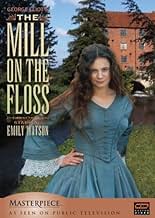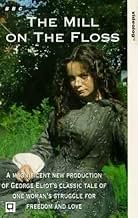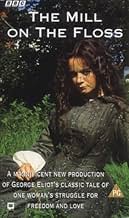Ajouter une intrigue dans votre langueLawyer Wakem takes away the mill on the river Floss from Edward Tulliver, whose ancestors owned it for three hundred years, and becomes the worst enemy of Tulliver's family. When Edward's da... Tout lireLawyer Wakem takes away the mill on the river Floss from Edward Tulliver, whose ancestors owned it for three hundred years, and becomes the worst enemy of Tulliver's family. When Edward's daughter, Maggie, grows up, she falls in love with Wakem's son Philip, but her brother Tom, ... Tout lireLawyer Wakem takes away the mill on the river Floss from Edward Tulliver, whose ancestors owned it for three hundred years, and becomes the worst enemy of Tulliver's family. When Edward's daughter, Maggie, grows up, she falls in love with Wakem's son Philip, but her brother Tom, true to the memory of their father, forbids her to meet him again. When she visits her cou... Tout lire
- Nominé pour le prix 2 BAFTA Awards
- 2 nominations au total
- Stephen Guest
- (as James Weber-Brown)
Histoire
Le saviez-vous
- ConnexionsFeatured in Masterpiece Theatre: The Mill on the Floss (1997)
Elliot was born in 1819, 2 years after Austen's masterpiece was published. I think it is safe to assume Elliot was very familiar with her compatriot's novels, probably having read them as a young girl. The characters in Elliot's story are not very much different in their social behavior and speech than were Austen's 43 years before. Mid-Victorian England was slow to shed the Georgian habits, though Elliot's people are more open and expressive of their emotions and inner turmoil. But the same sense of honor and "conscience" rules the behavior of both Elliot's and Austen's heroines.
Maggie Tulliver (Elliot) and Anne Elliot (Austen) have much in common. They are both highly intelligent, sensitive and loving women, under the yoke of the men in their lives. They both make terrible sacrifices for the men in their families. Both of them have fathers who are implacable, though highly different in their natures; Anne Elliot's being a useless fop and Maggie Tulliver's a bull-headed, good-hearted man. Both men are at the mercy of their prides.
But this is where the two stories diverge. Elliot's love story veers down the road to tragedy with the introduction of Stephen Guest, a man engaged to Maggie's cousin and subsequently falls hopelessly in love with Maggie. Anne Elliot, in Austen's story, is also besieged by a second man but he turns out to be a cad and she is aided by a deux-ex- machine in the person of her old school friend, Mrs Smith, who sets her wise to the duplicity of her Cousin, another Elliot, who is machinating to marry Anne for her money.
Maggie has no such luck in George Elliot's world. Perhaps this is indicative of the looming tragedy engendered by the growing complexity of human life during the industrial revolution, a shift in culture that brought tragedy to many people, especially in the rural parts of England, driving them from their agrarian lives they'd lived for centuries into the cities to be slaves for the new world of steam and iron. Sensitive souls often did not survive this transition and Maggie Tulliver and her brother, who tries to adapt, fall prey to the growing pressures of "keeping up."
'The Mill on the Floss' seems a natural extension of 'Persuasion' and would make a very nice double bill at home on some cold, winter's night. I can't help but wonder if Mary Ann Evans changed her name to George Elliot out of homage to Jane Austen.
Films of great literature inevitably have to omit a great deal, unless the BBC takes it on and does a multi-evening production, as they did with some of Dickens' novels, to great effect, notably 'Bleak House'.
But this adaption of 'The Mill on the Floss' was limited to 2 hours or so and cuts must obviously have been made. I haven't read the book but there seemed to be points in the film that left me thinking that I'd just jumped over a hole in the ground and I was viewing a cinematic Cliff Notes version of Elliot's mind-numbing tragedy.
Having said all that, I enjoyed this film. Mostly I think I liked it because I love Emily Watson. She is a super-charged Maggie Tulliver and carries the weight of her fateful tragedy with a steadfast resolve. Watson has a deep reservoire of feelings and brain- power from which to draw for her characters. Maggie Tolliver was an early part for her in her ever-burgeoning brilliant career. Already at this early stage she shows exceptional talent. And she's very beautiful into the bargain.
The supporting cast is excellent, especially Cheryl Campbell and Bernard Hill as her parents.
The photography is beautiful and the settings totally convincing. There is nothing precious about this 19th century classic and this allows the story to speak to modern viewers without seeming to be set in aspic.
Maggie's struggle with her conscience and love are heart-wrenching and her fate seems particularly horrible, with salvation seeming to be so close at hand.
If you are an admirer of Emily Watson I highly recommend this film, otherwise I'm not so sure that the slow pace and meditative atmosphere of Maggie's dilemma will hold the attention of those that are not interested in 19th century England. But I'd encourge anyone who is curious to seek this version of 'The Mill on the Floss' out. If you loved Roger Michell's recent version of 'Persuasion' I think you will like this film very much.
- pekinman
- 19 déc. 2004
- Lien permanent
Meilleurs choix
Détails
- Date de sortie
- Pays d’origine
- Langue
- Aussi connu sous le nom de
- Mlyn nad Flossa
- Lieux de tournage
- sociétés de production
- Consultez plus de crédits d'entreprise sur IMDbPro

































